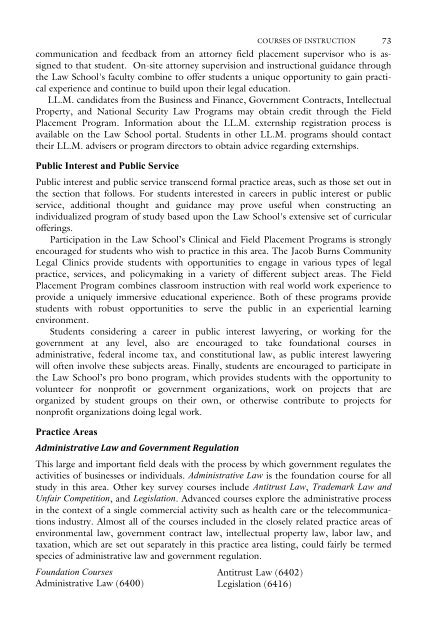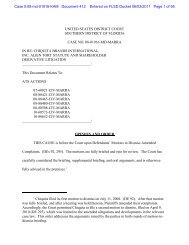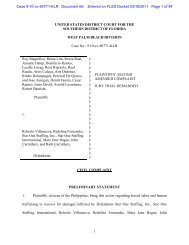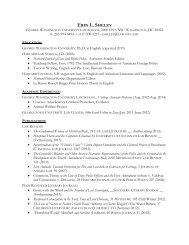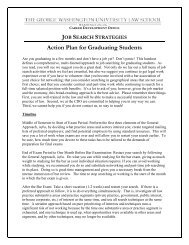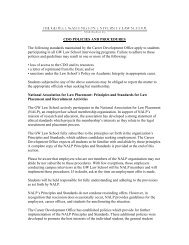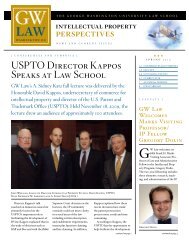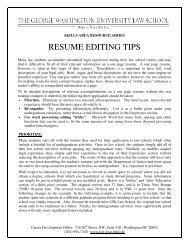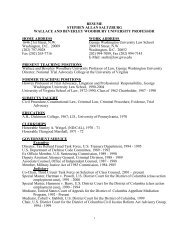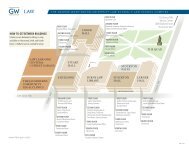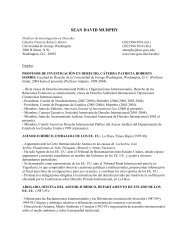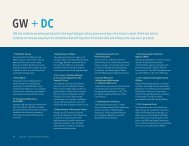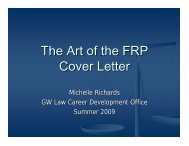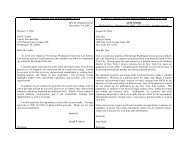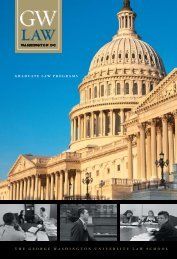The Bulletin - George Washington University Law School
The Bulletin - George Washington University Law School
The Bulletin - George Washington University Law School
- No tags were found...
Create successful ePaper yourself
Turn your PDF publications into a flip-book with our unique Google optimized e-Paper software.
COURSES OF INSTRUCTION 73communication and feedback from an attorney field placement supervisor who is assignedto that student. On-site attorney supervision and instructional guidance throughthe <strong>Law</strong> <strong>School</strong>'s faculty combine to offer students a unique opportunity to gain practicalexperience and continue to build upon their legal education.LL.M. candidates from the Business and Finance, Government Contracts, IntellectualProperty, and National Security <strong>Law</strong> Programs may obtain credit through the FieldPlacement Program. Information about the LL.M. externship registration process isavailable on the <strong>Law</strong> <strong>School</strong> portal. Students in other LL.M. programs should contacttheir LL.M. advisers or program directors to obtain advice regarding externships.Public Interest and Public ServicePublic interest and public service transcend formal practice areas, such as those set out inthe section that follows. For students interested in careers in public interest or publicservice, additional thought and guidance may prove useful when constructing anindividualized program of study based upon the <strong>Law</strong> <strong>School</strong>'s extensive set of curricularofferings.Participation in the <strong>Law</strong> <strong>School</strong>’s Clinical and Field Placement Programs is stronglyencouraged for students who wish to practice in this area. <strong>The</strong> Jacob Burns CommunityLegal Clinics provide students with opportunities to engage in various types of legalpractice, services, and policymaking in a variety of different subject areas. <strong>The</strong> FieldPlacement Program combines classroom instruction with real world work experience toprovide a uniquely immersive educational experience. Both of these programs providestudents with robust opportunities to serve the public in an experiential learningenvironment.Students considering a career in public interest lawyering, or working for thegovernment at any level, also are encouraged to take foundational courses inadministrative, federal income tax, and constitutional law, as public interest lawyeringwill often involve these subjects areas. Finally, students are encouraged to participate inthe <strong>Law</strong> <strong>School</strong>’s pro bono program, which provides students with the opportunity tovolunteer for nonprofit or government organizations, work on projects that areorganized by student groups on their own, or otherwise contribute to projects fornonprofit organizations doing legal work.Practice AreasAdministrative <strong>Law</strong> and Government RegulationThis large and important field deals with the process by which government regulates theactivities of businesses or individuals. Administrative <strong>Law</strong> is the foundation course for allstudy in this area. Other key survey courses include Antitrust <strong>Law</strong>, Trademark <strong>Law</strong> andUnfair Competition, and Legislation. Advanced courses explore the administrative processin the context of a single commercial activity such as health care or the telecommunicationsindustry. Almost all of the courses included in the closely related practice areas ofenvironmental law, government contract law, intellectual property law, labor law, andtaxation, which are set out separately in this practice area listing, could fairly be termedspecies of administrative law and government regulation.Foundation CoursesAdministrative <strong>Law</strong> (6400)Antitrust <strong>Law</strong> (6402)Legislation (6416)


